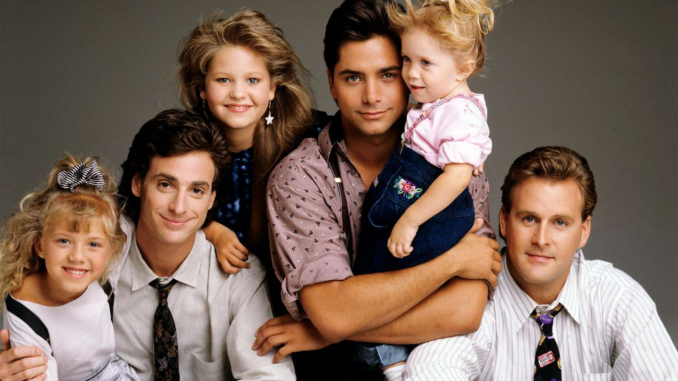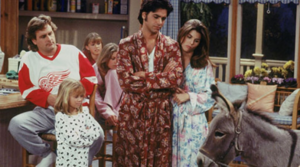
If you’re a fan of family sitcoms, then Full House is likely one of the shows that defined your childhood. It was a warm, feel-good series that brought laughs and life lessons week after week. But one question still looms in the minds of fans: why did Full House end after season 8?
In this article, we’re going to take a deep dive into the surprising reasons behind the show’s premature ending and the behind-the-scenes dynamics that led to its conclusion. From cast contract issues to behind-the-scenes drama, there’s more to the story than you might think.
The Rise of Full House: A Cultural Phenomenon
Before we get into why the show ended, let’s briefly look at how Full House became a cultural sensation. The show, which premiered in 1987, quickly captivated viewers with its heartwarming storylines, quirky characters, and wholesome family values. Over the course of eight seasons, Full House became synonymous with family-friendly entertainment.
The show starred Bob Saget as Danny Tanner, John Stamos as Uncle Jesse, and Dave Coulier as Uncle Joey. Together with the rest of the cast, they created a dynamic that kept fans coming back for more, episode after episode. But as popular as it was, all good things must come to an end.
The Cast and Crew: Key Players in the Show’s Demise
One of the main reasons for Full House’s early end had to do with the growing demands and career trajectories of its cast members. As the show went on, the stars of Full House were becoming bigger names in Hollywood, and they wanted to pursue other opportunities.
Bob Saget’s Growing Career
Bob Saget, who played Danny Tanner, was already a well-established comedian by the time he joined the show. While his role as a fatherly figure on Full House made him a household name, Saget’s comedic career was beginning to take off, and he wanted to explore more mature projects. His commitment to stand-up comedy and other film projects became increasingly difficult to balance with his role on Full House.
John Stamos: The Heartthrob’s Pursuit of Other Roles
John Stamos, who played the beloved Uncle Jesse, was another key player in the show’s success. While he became famous for his role as the handsome, rock-and-roll-loving uncle, Stamos also began pursuing other acting opportunities during the show’s run. His fame as a heartthrob opened doors for him in movies, and he felt it was time to move on.
Dave Coulier and the Strain of the Show
Dave Coulier, who played Uncle Joey, had his own set of challenges. While he was known for his impeccable comedic timing, Coulier started to feel limited by his role as the goofy but lovable uncle. The desire for more diverse roles eventually led him to consider his future after season 8.
The Network’s Decision: Was Full House Canceled?
While the cast’s shifting priorities played a significant role, Full House’s end wasn’t entirely due to personal decisions. The network, ABC, had a hand in pulling the plug on the show as well. By the time season 8 rolled around, ABC had shifted its focus to other shows that were performing better in the ratings.
Shifting Audience Preferences
In the late ’80s and early ’90s, the television landscape was changing. New sitcoms, such as The Simpsons and Family Matters, were gaining popularity and attracting younger audiences. ABC had to adjust its programming to reflect these changes, and Full House was seen as a show with an aging audience, meaning it wasn’t as in demand as it once was.

The Final Season and the Show’s Legacy
Although season 8 was technically the final season, it wasn’t a total surprise to fans. By this point, the show had already explored various storylines and family dynamics, and the characters had gone through significant personal growth. While there was still room for more stories, many felt it was the right time to close the chapter on the Tanner family’s adventures.
The Impact of the Show’s End on Fans and Pop Culture
When Full House ended, it left a void in the hearts of fans. The show had become a part of the cultural fabric, and people didn’t want to say goodbye to the Tanners. The impact of the show’s end was felt far beyond its final episode.
The Rise of “Fuller House”
After the conclusion of Full House, fans got a taste of nostalgia when Netflix released Fuller House in 2016. The show brought back the original cast, along with some fresh faces, and gave fans a new chapter in the Tanner family saga. Fuller House showed just how much people loved the original show and why it continues to resonate with audiences today.
What Could Have Happened If Full House Had Continued?
Fans often wonder: what would Full House have been like if it hadn’t ended after season 8? Would the show have continued to explore new family dynamics? Or would it have faced a decline in viewership like other long-running shows?
One possibility is that the show could have seen a change in format, focusing more on the adult lives of the Tanner family members. There were also opportunities to explore more diverse storylines, such as dealing with issues like college, career changes, and relationships. However, with so many cast members wanting to branch out, it’s possible the show would have lost the magic that made it so lovable.
Conclusion: Why Full House Ended After Season 8
In the end, Full House’s cancellation was the result of a combination of factors. The cast members were ready for new challenges, the network shifted its programming focus, and the series had run its course. While it may have ended sooner than expected, the impact of Full House on popular culture remains undeniable.
Fans were left with lasting memories of the Tanner family’s journey, and the legacy of the show continues to live on through Fuller House, reruns, and fan conventions. Sometimes, a show’s end is simply a new beginning for everyone involved, and Full House proved that.
FAQs
1. Why did Full House end after season 8?
Full House ended after season 8 due to a combination of cast members seeking new opportunities, changing network priorities, and shifting audience preferences. The show had a successful run but ultimately came to a natural conclusion.
2. Did Bob Saget want to leave Full House?
Bob Saget had a growing career outside of Full House, particularly in stand-up comedy. As his other projects began to gain momentum, he decided it was time to explore new opportunities, contributing to the decision to end the show.
3. Was Full House canceled or did it end on its own terms?
The show wasn’t exactly canceled, but it was wrapped up due to the cast’s growing demands and ABC’s decision to shift its programming focus. Season 8 served as the natural end to the series.
4. How did Full House impact TV culture?
Full House became an iconic show in TV culture, known for its wholesome family values, humor, and memorable characters. Its impact can still be felt through reruns, fan conventions, and the 2016 Netflix spin-off, Fuller House.
5. Could Full House have continued beyond season 8?
While it’s possible Full House could have continued with new storylines, the cast’s desire for new projects and the changing TV landscape made the show’s end the right choice. It would have been difficult to maintain the same magic without the original dynamic.
